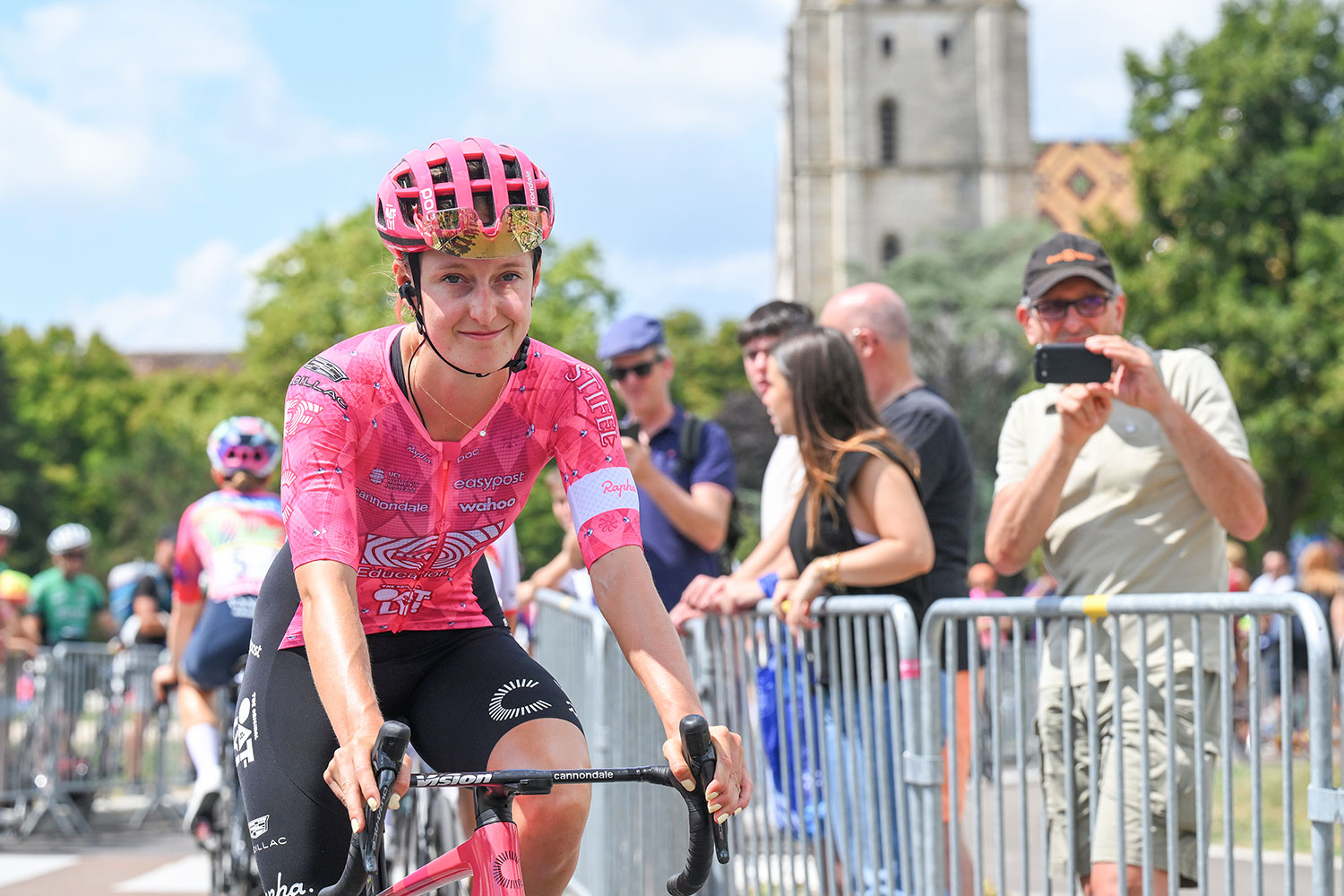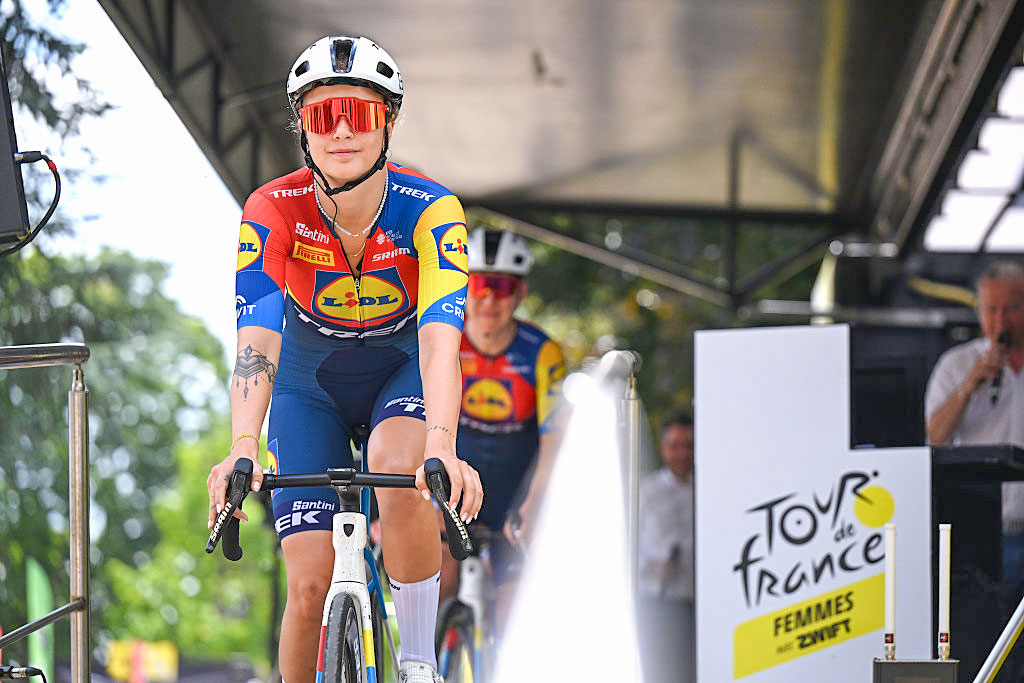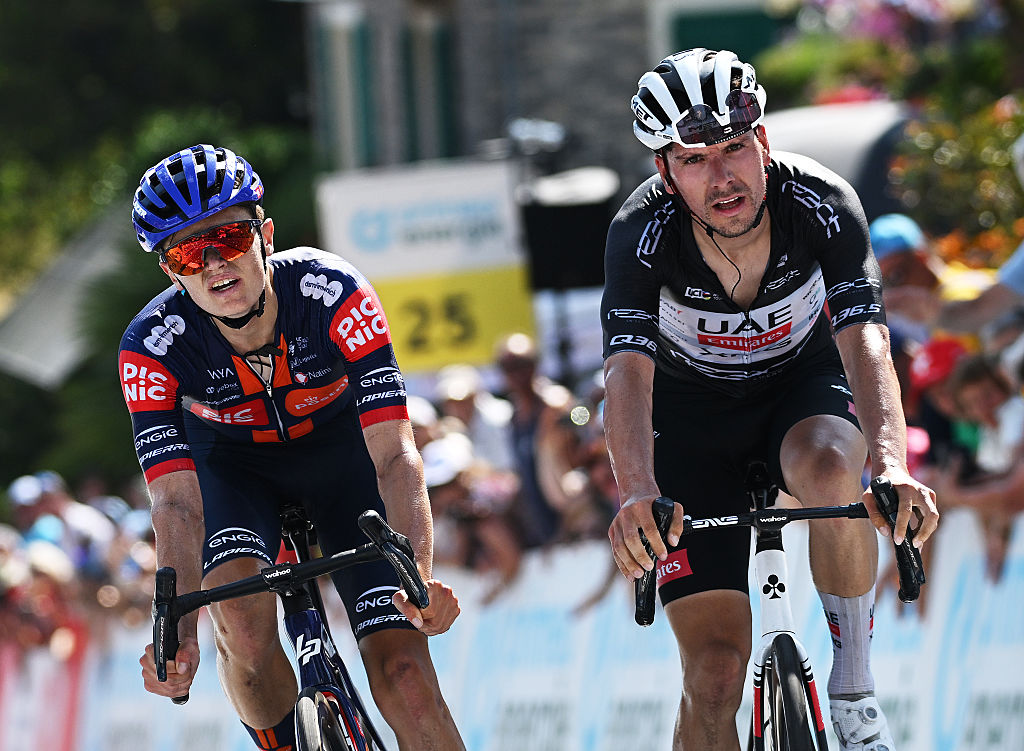'Breaking the taboo' – Tour de France Femmes riders highlight issues of low rider weight and disrupted menstrual cycles
Cédrine Kerbaol says the sport is in 'a dangerous moment' for rider health as Magdeleine Vallieres and Emma Norsgaard talk about their own their struggles balancing racing weight and menstrual health

The latest race content, interviews, features, reviews and expert buying guides, direct to your inbox!
You are now subscribed
Your newsletter sign-up was successful
A year on from finishing sixth at the Tour de France Femmes, Cédrine Kerbaol is deep in the midst of the GC battle once again this July. The Breton racer has been making headlines away from the racing, too, emerging as a spokeswoman of sorts on the topic of rider health.
Kerbaol, who has a diploma in nutrition studies, recently told French newspaper L'Humanité that cycling is in a "dangerous moment" with pressure to lose weight for races risking negative side-effects to the riders' health.
"Indirectly, young women trying to perform will look to them as examples," Kerbaol said. "In recent years, it has been very fashionable to count every gram on our plates. We must not fall into a form of dehumanisation and infantilisation."
Cycling's high emphasis on watts per kilogram (w/kg) brings expectations on riders to lose weight for races, and the clear negative effects on the body of doing so have prompted Kerbaol to create an Instagram account, @f.e.e.d_powr (Fuelling for Endurance, Energy, and Durability), to raise awareness and speak out on the topic.
Kerbaol said she hopes the account can serve as an example to others, rather than shaming them.
"I wasn't expecting to speak about it yesterday, but there had been a lot of positive response from a lot of people who have the same ideas but don't know if others share them too," she told the assembled media, including Cyclingnews and Cycling Weekly, at the start of stage 6 of the Tour in Clermont-Ferrand.
"I think it has started to break the taboo, and that can have a positive prevention effect. I had a discussion with the French Cycling Federation and the rider union, and it made me reflect and get in touch with health professionals. We want to be directed better to people we can trust and, in the medium- and long-term, involve male cyclists, too."
Kerbaol hopes that her project can help riders in both the men's and women's pelotons, as everyone can be adversely affected by the effects of low weight and under-fuelling. In recent years, a number of athletes, including Georgia Williams, Kaia Schmid and Evie Richards, have come out and discussed the impact of RED-S, otherwise known as relative energy deficit in sport.
The syndrome occurs when riders fail to take in enough energy to support the amount expended during racing and training, disrupting hormone production and causing a range of negative impacts, including fatigue, reduced immunity, early osteoporosis, and menstrual disorders.
"We had reached the point where girls think that being very thin is a good example. Except that it's not normal to have decalcified bones at 20, it's not normal to no longer have your period," Kerbaol told L'Humanité.
"Before being athletes, we are also women, and our health matters now, but it matters for the future, too."
Kerbaol's EF Education-Oatly teammates, Olympic champion Kristen Faulkner, and young Canadian Magdeleine Vallieres, have both featured on the @f.e.e.d_powr feed to tell their stories.
"I never would have won two Olympic gold medals, let alone one, if I had tried to optimise for being the skinniest version of myself. I needed to optimise for being the strongest, healthiest Kristen," Faulkner said.
In a separate post, Vallieres said she hadn't had her period in six years before this summer and thought her experience was normal. Her team has been helping her regain her health and get her period back.
"They said directly when I came to the team that it was a priority for us to be healthy and that they get it back," Vallieres told Cyclingnews in Clermont-Ferrand.
"So the last year and a half, we've been working on it a lot. So yeah, it was really a good moment to get it just before the Tour as well.
"Mentally, I feel that I know that I'm healthy. I think that, for sure, my body is healthier now. So, it's good."
Vallieres, who joined EF this season having previously raced under a different structure at the now-defunct Continental EF-Tibco-SVB team, also praised Kerbaol's project, calling her "a good inspiration" for herself and others in the peloton.
"It's a good inspiration. And also, she's performing at the top level, and she has [her period], and she speaks a lot about it. So yeah, it's all we always celebrate when one of us is on her period."

Her words echo those of Lidl-Trek rider Emma Norsgaard, who said on 'La Course du Gossip', her and Floortje Mackaaij's podcast, "I'm not losing weight if I'm eating clean, but my body is awarding me with giving me my period back, and I become really proud always.
"It's not only performing on the bike that this will help you, but in general life. You will benefit from this, and it's really important to have it under control because you want a normal life after this," she added, noting that she makes sure she menstruates at least 3 or 4 times per year.
Speaking to Cyclingnews, Norsgaard said that cycling's focus on w/kg means that striking the balance between health and top performance can be difficult.
"I think in road cycling, it's growing into a more positive thing that it's OK to have your period, it's OK to not be super skinny, and it's OK to be skinny," Norsgaard said.
"It's something that I think we talk a bit more about in the teams, and it's a difficult sport with this, because it is all about weight. It's really difficult to say what the right answer is, because you see skinny girls making results and not skinny girls making results.
"You want to be healthy, but sometimes you also need to make results. And it's maybe hard for you to tell yourself, 'I need to gain weight, you know?' So it's really difficult."
Tour de France Femmes leader Kim Le Court-Pienaar also put the issue in the spotlight when she won stage 5 into Guéret.
The Mauritian racer said after the stage that "it was her time of the month". Kerbaol also said she's "super happy" to have her period before a race, calling menstruation "a superpower" and noting that "you're in a very beneficial hormonal phase, very good for recovery" after a period. "The release of glycogen, which fuels your muscles, is very beneficial," she said.
Of course, not every rider will have the same positive outcomes, considering the negative side effects of menstruation, such as cramps and fatigue.
"It's not affecting [Le Court-Pienaar] so much, I guess," Norsgaard said. "For some people, you can really feel shit. Personally, I don't feel like the same person. I don't want to race the Tour de France if I have my period. But it's nice for her that she can still win the stage."
Teams and riders have, in the past, sought to avoid that during major races, going so far as to use contraceptive pills to do so. That practice appears to be on the decline, however.
A recent report in NOS highlighted several teams' reluctance to practise 'menstruation management', with EF doctor Eder Etxeverria recently telling NOS that contraceptive pills would only be used "in exceptional circumstances. When our team leader is about to get her period during her main goal, for example."
The notions of healthy weight and race weight may have come into conflict as those at the top level of cycling seek every advantage – "I know we're not the only ones but sometimes it feels like you're the only one struggling with it," Norsgaard said on her podcast – but with more and more riders speaking out on the issue, raising awareness, and normalising it, hopefully the peloton will only get healthier and healthier.
A post shared by F.E.E.D (@f.e.e.d_powr)
A photo posted by on
Subscribe to Cyclingnews for unlimited access to our Tour de France Femmes coverage. Don't miss any of the breaking news, reports, and analysis from one of the biggest women's stage races of the season. Find out more.

Dani Ostanek is Senior News Writer at Cyclingnews, having joined in 2017 as a freelance contributor, later being hired full-time. Her favourite races include Strade Bianche, the Tour de France Femmes, Paris-Roubaix, and Tro-Bro Léon.
You must confirm your public display name before commenting
Please logout and then login again, you will then be prompted to enter your display name.
